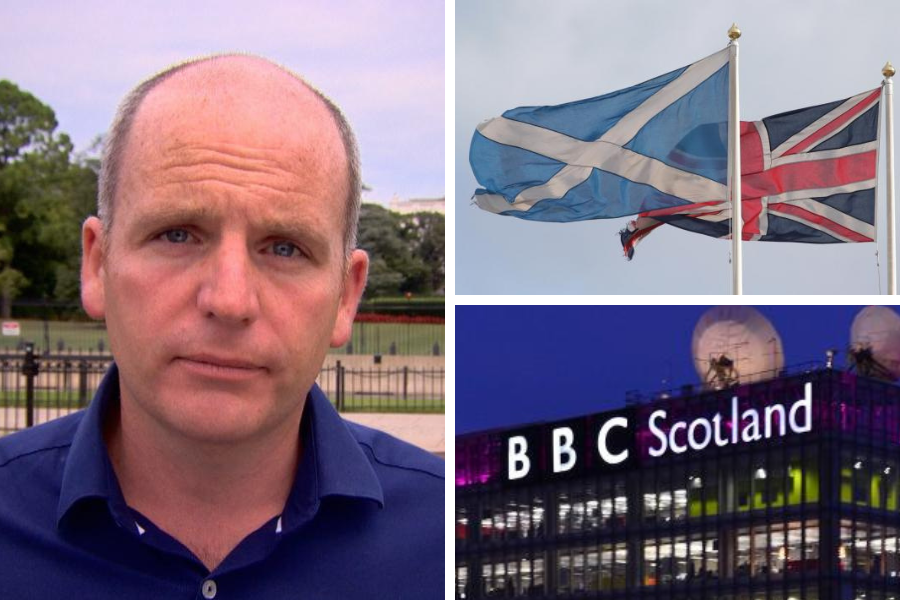
THE BBC has rejected any suggestion that its Scottish political editor broke guidelines by sharing an article on indyref2 from a well known former Unionist commentator.
Glenn Campbell, who became BBC Scotland’s political editor in 2021, shared a blog post written by David Torrance, who formerly worked as a columnist for The Herald.
Torrance had addressed the question of the legality of Holyrood legislating for a second independence vote on a blog run by the “Constitution Unit” at University College London.
In the post, titled "The festering issue – the legality of a second independence referendum”, Torrance argued that the courts would likely find that a bill on such a vote would be outwith Holyrood’s powers.
He says that the Scotland Act considers something to be outside of the Scottish Parliament’s competence if it “relates to reserved matters”, and argues that because a second vote would “relate to” the reserved matter of the Union it is not something Holyrood can legislate for.
Torrance concluded: “Consideration of electoral mandates or the ‘sovereignty of the Scottish people’ are unlikely to detain the Supreme Court for long.”
Sharing the article, the BBC’s Campbell wrote on Twitter: “For anyone interested in the legal arguments over #indyref2 without UK agreement, @davidtorrance has been doing some serious swotting, which is worth a read … ”
For anyone interested in the legal arguments over #indyref2 without UK agreement, @davidtorrance has been doing some serious swotting, which is worth a read… https://t.co/trRTShnWTK
— Glenn Campbell (@GlennBBC) June 20, 2022
The post was widely criticised, with Mike Small from the pro-independence site Bella Caledonia pointing to Section 4 of the BBC’s guidelines, which deals with impartiality.
Making clear that the guidelines also apply to the social media accounts of reporters and staff, the guidelines state: “Where our content highlights issues on which others campaign, we must take care not to endorse those campaigns.”
"The external activities and public comments, for example on social media, of staff, presenters and others who contribute to our output can also affect perceptions of the BBC’s impartiality. Consequently, this section should be read with Section 15: Conflicts of Interest."
— Bella Caledonia (@bellacaledonia) June 20, 2022
Small added: “Is it normal practice for the BBC to promote individual blogs? @GlennBBC? Look forward to you promoting Bella to your readers soon.”
Torrance is known for holding strong Unionist views. In an article for Politico in 2017 he claimed: “If saving the Union rested upon a straightforward cost/benefit analysis of Scotland’s place in the UK, then the No camp would win easily.”
Small later told The National: "Though David Torrance is writing on an academic environment, he's still a highly partisan figure and his writing is clearly political.
“It is inconceivable that the political editor of BBC Scotland would promote someone from the other side of the constitutional debate, in fact he never has and never will.
“At a time when the next referendum has been announced you'd have thought that the BBC in Scotland might have some sensitivity or make some effort to appear even-handed. Apparently not."
Torrance quit his role as a journalist and commentator in April 2018 and is now a civil servant working as a constitutional specialist in the Commons Library. The blog on the UCL site was peer-reviewed by two constitutional academics.
Around three hours after the blog was shared, Campbell shared a second article from The Scotsman offering opposing views from a prominent QC.
The BBC reporter wrote: “While prevailing legal view may not be very helpful to @scotgov the QC Aidan O’Neill has previously said there are ‘good arguments’ in favour of #indyref2 without a section 30 being lawful (summarised in this article, which has a link to his full opinion).”
O’Neill, an expert in constitutional law, said “the provisions of the Scotland Act 1998 as they currently stand” could allow MSPs to legislate for indyref2 – but warned that the conclusion would need to be tested in court.
The BBC denied that the first post had broken any editorial code.
A spokesperson told The National: “This is not in breach of editorial guidelines.
“The tweet did not link to a campaigning article. It’s an academic article setting out, without comment, what the Scotland Act says, and what the legal debate has been, on the competence of the Scottish Parliament to hold a consultative referendum.”
The BBC was further asked if Campbell's follow-up tweet wasn't a tacit acceptance of a lack of balance in the first.







